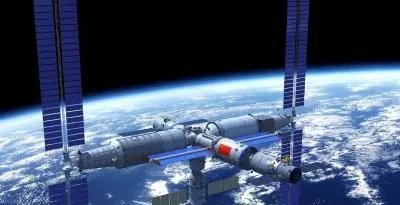
Mysterious bacteria discovered by Chinese scientists on Tiangong Space Station
text_fieldsA team of Chinese scientists has identified a new bacterial species aboard the Tiangong Space Station. Named Niallia tiangongensis, the microbe was discovered in samples taken from the station's surfaces during the Shenzhou 15 mission, which concluded with the crew’s return to Earth in June 2023.
As detailed in a study published in the International Journal of Systematic and Evolutionary Microbiology, the bacterium is characterized as aerobic, spore-forming, and rod-shaped with unique adaptations. This marks the first discovery of a new microbial species on the Tiangong, a three-module space station orbiting in low Earth orbit.
According to the paper, the newly discovered bacterial strain is very similar to Niallia circulans, a species found on Earth, but it has developed several mutations that may be valuable for studying how life adapts to space.
"Understanding how microbes behave during extended space missions is crucial for protecting astronaut health and ensuring spacecraft systems remain operational," the study notes, as reported by Science Alert, NDTV reported.
Researchers found that this new strain has a distinctive ability to break down gelatin, which could be advantageous in nutrient-scarce environments. It also displays structural and functional changes in two important proteins, which might improve its ability to form biofilms, respond to oxidative stress, and repair radiation damage.
These traits suggest that the microbe has evolved specific mechanisms to help it survive under the harsh conditions of space, the study concludes.
It remains unclear whether the newly identified bacteria pose any risk to the health of astronauts aboard the Tiangong space station.
Studying which microbes can survive in space habitats is crucial for understanding how to control and avoid contamination on board.
Importantly, this isn’t the first instance of discovering new microbial species in space. As reported by Space.com, several previously unknown bacteria have been found on the International Space Station, including some that may assist astronauts in cultivating crops on Mars.
More recently, scientists also uncovered 26 entirely new bacterial species in NASA’s clean rooms—some of the most meticulously sterilized environments ever created by humans.























